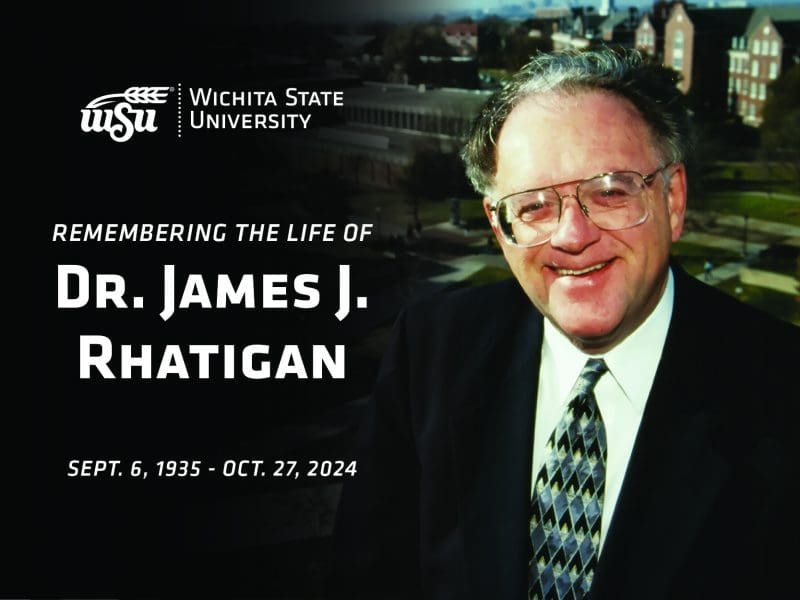A national figure in educational activism, Dr. James J. Rhatigan, professor of education and senior vice president emeritus, died yesterday, Sunday, Oct. 27, in Wichita. Rhatigan served Wichita State for nearly six decades, arriving on campus in 1965 as the university’s first and the nation’s youngest dean of students, at just 30 years old. In 1971, he became vice president for student affairs, holding that position until 1997 and going on to serve as senior vice president until his retirement from WSU in 2002.
“Dr. Rhatigan was an exemplar of integrity, compassion and principled leadership,” WSU President Rick Muma says. “His professional commitment to excellence in higher education and his ethic of caring for those he came in contact with, most especially students, were simply unparalleled. His influence here at Wichita State won’t be forgotten.”
Recruited by then WSU President Emory Lindquist to build a “modern division of student affairs,” Rhatigan also served as Wichita State’s top student affairs administrator on the executive teams of three other presidents, Clark Ahlberg, Warren Armstrong and Eugene Hughes for a combined 32 years. His responsibilities included advising members of the Student Government Association. In 1997, the year he stepped into his new role as senior vice president, Rhatigan talked about his three decades at WSU.
“My goal,” he said, “was to do everything prudently possible to remove the obstacles, clarify the issues and ameliorate any feelings that hindered students from achieving their goals — from obtaining their education.”
For Mike James ’71, a member of the WSU Foundation and Alumni Engagement board who served as SGA president his senior year, Rhatigan was “the most influential educator I have ever known. He touched my life in multiple ways both during my time at Wichita State and after. Not only was Jim a one-of-a-kind educator, he transitioned into a most valued friend. He was simply the best.” It was James who gifted Rhatigan a small, bronze statue with an inscription that reads, in part, “The Student’s Best Friend — Always.”
Mike Meacham ’74, SGA president during the 1972-73 academic year, is among the legions of alumni who’ve learned from Rhatigan’s example.
“Jim was a guiding light for me,” Meacham wrote in a tribute to him in 2021. “I learned a lot from him — to stay open to new ideas and new thinking; understand that others’ circumstances have brought them to the place where they are in front of you; engage with others against the backdrop of producing the greatest good for the greatest number. Shine a light on a path that enables and empowers others to succeed; do that not for the ego of holding the lantern, but for the act of giving to others the possibility for self-enlightenment and growth.”
Renowned for his wit and wisdom, Rhatigan — an Iowa native who earned a bachelor’s degree in American history from Coe College, a master’s degree, also in American history, from Syracuse University and, in 1965, a doctorate in college student personnel administration from the University of Iowa — not only garnered scores of accolades and awards as a student affairs professional, he is — most appropriately — the namesake of the Rhatigan Student Center.
From 2002 until 2014, Rhatigan continued his university advocacy as a consultant for the WSU Foundation (since 2022 the WSU Foundation and Alumni Engagement). Ever the consummate professional with an eye to helping people, whatever their challenge, Rhatigan worked tirelessly and continuously throughout his tenure at Wichita State and the WSUFAE to increase access to education for tens of thousands of students, yet he never lost sight of the importance of fostering relationships on the individual level.
“I was blessed to work with Jim for close to 33 years,” says Dr. Elizabeth King, WSUFAE president and CEO emerita and former WSU vice president for university advancement. “I’m deeply saddened by the loss of my long-time colleague and dear friend. It’s impossible to capture in a few words the enormous impact he had on our university. The most frequent praise I’ve heard from alumni over the years is: ‘He was MY Dean!’ He was a tireless advocate for the needs of students and an icon nationally in the world of student affairs. He is truly one of the great ones!”
A prolific and eloquent writer, Rhatigan penned his thoughts about the term alma mater — “fostering mother” — for an address he presented in 1984. He approached the subject from a historical perspective, going back 600 years. Yet it didn’t take him long to zero in on the relational heart of the matter: “Alma mater is an anthropomorphic reference to higher education in which its creator apparently sensed and identified a phenomenon I feel is of profound importance. It implies a relationship between student and institution that is of inestimable value — deep and abiding.”
More recently, he wrote this: “Lives are changed on college campuses, this year and every year. Not every experience is positive but in their accumulation a higher education changes all of us. We know that when our life is changed others also are affected, in a growing circle of people who are integral to our life. Importantly, one never has to leave a campus because it is an idea, not merely a place. We can look backward from present circumstances that may be difficult and remember the best within us.”
Jim Rhatigan, who as recently as two weeks ago was in his campus office working, will long be remembered as one of the very best among us.
Memorials may be made to the University Congregational Church (https://ucchurch.org/), where Rhatigan and his wife, Beverly, were charter members, and the WSU Rhatigan Emergency Fund (https://fundraising.idonate.com/wichita-state-university-foundation/Rhatiganemergencyfund), which the Rhatigans set up in the 1960s to help students in crisis.

